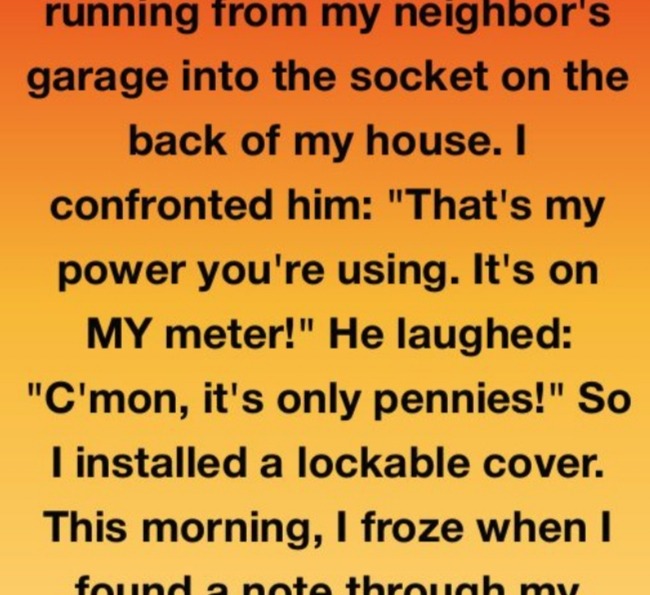The Cord Between Us
A small electrical cord, a locked socket, and a single note—how one tiny thing opened the door to compassion, connection, and community.
The Unexpected Discovery
It started with an extension lead running from my neighbour’s garage into a socket on the outside of my house. Shock gave way to anger. I marched over and confronted him. “That’s my power you’re taking,” I said. He laughed it off—“C’mon, it’s only pennies!”—but I felt violated. The next day I installed a lockable cover over the outlet.
“You’re colder than your electricity, mate.”
The note appeared the following morning. At first I was indignant. Then, strangely, a prickle of guilt.
Ron’s Story
Ron had lived next door for about ten years. Before his wife Maureen died, we were friendly—barbecues, borrowing tools, small talk over the fence. After she passed, Ron withdrew to his garage and kept to himself. I’d brought food a few times, but he never invited me in.
When I saw that cord, I assumed convenience; I never stopped to think there might be desperation behind it. I was wrong.
Discovering the Truth
One evening the garage was entirely dark. No radio, no movement. Unease led me over to Ron’s door. I knocked. No answer. Through a frosted garage window I peered in and saw him—lying on the floor. I climbed the fence, pushed open the unlocked door, and called for help. He was breathing, but barely.
Paramedics later told me Ron’s diabetes, poor nutrition, and lack of refrigeration had left him near collapse. His fridge had broken and his power had been cut; he’d run that extension lead to my house rather than ask for help. If I hadn’t checked that night, things could have been much worse.
Reconnection and Repair
After Ron came home from the hospital I brought groceries and a small heater. I apologised: “I’m sorry—for not asking.” He answered, “It’s not your job to help, mate.”
But I did help. I arranged a payment plan with the energy company, found secondhand appliances, and called a friend to fix a leaking roof. Neighbours began to chip in too: soup, blankets, an electrician who donated LED lights. Little acts rippled outward, and Ron slowly came back to life—repairing a mower one day, fixing a child’s scooter the next.
The Cord Between Us
A month later Ron knocked with a grin. “I need your socket again—just for today. Big surprise coming.” He used my tools, and that evening he presented a beautiful handmade bench carved with birds. A plaque read: “The Cord Between Us.” He’d used my power tools without asking—and I didn’t mind. The cord had become a symbol, not of theft, but of connection.
The Power of Care
Ron began volunteering at a local repair shop helping families in need. He received letters from people touched by his work. Eventually he moved closer to town to be near more people. Before he left, he gave me a small wooden carving of two houses connected by a wire with the words: “It’s not the power you share. It’s the warmth.” It sits on my windowsill as a daily reminder to notice, ask, and reach out.
Final Thoughts
We lock sockets and doors to protect what’s ours—but sometimes, without meaning to, we lock people out. Behind closed doors there are often stories and quiet needs. Reconnection doesn’t require grand gestures; it often starts with a knock, a note, a bowl of soup, or a simple question: “Are you okay?”






